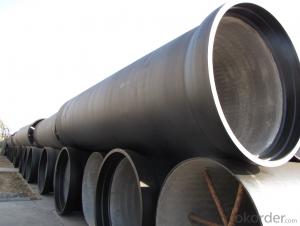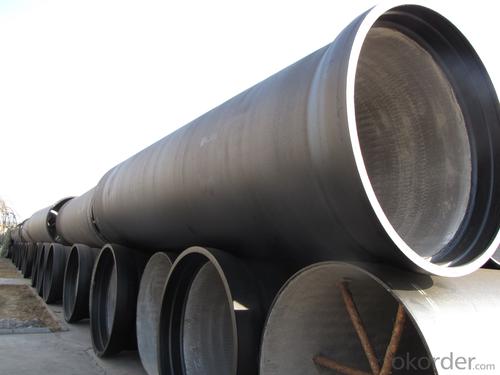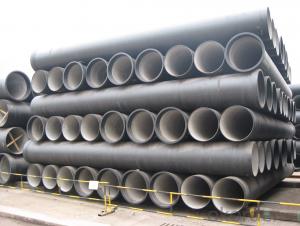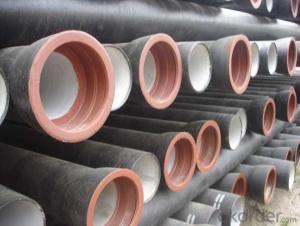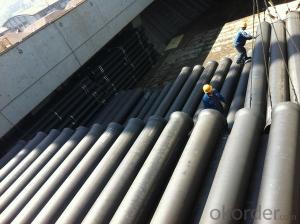EN545 Ductile Iron Pipe DN300 socket spigot pipe
- Loading Port:
- Tianjin
- Payment Terms:
- TT OR LC
- Min Order Qty:
- 200 m.t
- Supply Capability:
- 30000 m.t/month
OKorder Service Pledge
OKorder Financial Service
You Might Also Like
1) The standard of pipe: ISO2531:1998, EN545:2006,K9 K8
2) Effective length: 6m/5.7m
3) Inner cement line: Portland cement lineas per ISO4179
4) Zinc coating: at least 130g/m2 as per ISO8179
5) Bitumen painting: at least 70μm as per ISO8179
6)With 102% quantity of NBR, SBR, or EPDM ring asper ISO4633
7) DN80-DN1200
8) Highstrength, lighter than grey iron, good corrosion resistance, no furring, smallflow resistance, easy fixing, long life tome about 100 yeas
9)Checked by automatic inspection equipment
10) Composition:
Chemical composition | |||
Chemical composition | Ductile Cast Iron Pipe (%) | Grey iron pipe (%) | Steel pipe (%) |
C | 3.5-4.0 | 3.2-3.8 | 0.1-0.2 |
Si | 1.9-2.6 | 1.4-2.2 | 0.15-0.4 |
Mn | 0.15-0.45 | 0.4-0.6 | 0.3-0.6 |
P | ≤0.06 | ≤0.3 | 0.02-0.03 |
S | ≤0.02 | ≤0.1 | 0.02-0.03 |
Mg | 0.03-0.06 |
|
|
11) Feature:
Mechanical properties | |||
| Ductile Cast Iron Pipe | Grey Iron Pipe | Steel Pipe |
Tensile Strength(Mpa) | ≥420 | 150-260 | ≥400 |
Yield Strength(Mpa) | ≥300 | No Confirmation | No Confirmation |
Bending Strength(Mpa) | ≥590 | 200-360 | ≥400 |
Elongation (%) | ≥10 | Neglected | ≥18 |
Brinell Hardness(HBS) | ≤230 | ≤230 | About 140 |
12) T type mechanical joint
13) Packing: in bulk or container
PACKING: 1) Pipesare bundled together with the steel belt.
2) Wooden pieces are put between the pipes.
- Q: Are ductile iron pipes suitable for industrial water systems?
- Ductile iron pipes, well-known for their strength, durability, and resistance to corrosion, are a perfect choice for industrial water systems. With the capability to withstand high-pressure and heavy-duty applications, these pipes are ideal for transporting water in large-scale industrial facilities like power plants, factories, and chemical plants. Moreover, ductile iron pipes can handle a broad range of temperatures, making them suitable for both hot and cold water systems. Their inherent flexibility allows for easy installation and maintenance, enhancing their suitability for industrial water systems. In conclusion, ductile iron pipes offer a dependable and economical solution for industrial water transportation requirements.
- Q: Can ductile iron pipes be used for irrigation systems in saline soil conditions?
- Yes, ductile iron pipes can be used for irrigation systems in saline soil conditions. Ductile iron pipes have excellent corrosion resistance properties, making them suitable for use in saline environments. However, it is important to consider the specific requirements and consult with experts to ensure proper selection and installation methods are implemented for optimal performance and durability in such conditions.
- Q: Can ductile iron pipe be used for horizontal directional drilling?
- Yes, ductile iron pipe can be used for horizontal directional drilling (HDD). HDD is a trenchless method of installing underground utilities, such as pipelines, without the need for traditional open-cut trenching methods. Ductile iron pipe is often used in HDD projects due to its strength, durability, and ability to withstand the stresses and strains associated with directional drilling. It has excellent resistance to external loads and can withstand the bending and pulling forces involved in HDD installations. However, it is important to consider factors such as pipe diameter, wall thickness, and soil conditions to ensure proper pipe selection for HDD projects. Additionally, proper installation techniques and precautions should be followed to ensure the long-term performance and integrity of the ductile iron pipe in HDD applications.
- Q: Can ductile iron pipes be used for pressure relief systems?
- Indeed, pressure relief systems can make use of ductile iron pipes. Renowned for their robustness, longevity, and capacity to endure intense pressure circumstances, ductile iron pipes possess a remarkable resilience against both internal and external pressures. Consequently, they prove to be ideal for deployment within pressure relief systems. Furthermore, ductile iron pipes can withstand considerable fluctuations in pressure without jeopardizing their structural integrity. Consequently, they find widespread usage in various settings necessitating pressure relief systems, including water supply networks, wastewater treatment facilities, and industrial operations.
- Q: Can ductile iron pipes be used in areas with high levels of hydrogen sulfide gas and corrosion potential?
- Before making a decision, it is important to take certain factors into consideration when considering the use of ductile iron pipes in areas with high levels of hydrogen sulfide gas and corrosion potential. Ductile iron pipes display a strong resistance to corrosion, particularly when they are adequately protected with external coatings and linings. This characteristic makes them appropriate for environments with moderate levels of hydrogen sulfide gas and corrosion potential. Nevertheless, in areas with exceedingly high levels of hydrogen sulfide gas and severe corrosion potential, alternative materials such as corrosion-resistant alloys or specially coated pipes may be more suitable. To determine the suitability of ductile iron pipes, conducting a thorough evaluation of the specific conditions in the area is crucial. Factors such as the concentration of hydrogen sulfide gas, the presence of other corrosive elements or chemicals, and the overall corrosiveness of the environment should be taken into account. Furthermore, consulting the local regulations and industry standards is essential to ensure compliance and safety. In conclusion, while ductile iron pipes can withstand moderate levels of hydrogen sulfide gas and corrosion potential, it is necessary to conduct a comprehensive assessment of the specific conditions. In areas with high levels of hydrogen sulfide gas and severe corrosion potential, consulting with experts in the field and considering alternative materials may be required.
- Q: Can ductile iron pipes be used for potable water systems?
- Yes, ductile iron pipes can be used for potable water systems. Ductile iron is a strong and durable material that is resistant to corrosion and has been widely used in water distribution systems for many years. It meets the necessary standards and regulations for the transportation of potable water, making it a suitable choice for such applications.
- Q: How can the cast iron pipe be connected?
- Cast iron pipes are flanged and socket connected
- Q: What is the difference between a cast iron pipe and a ductile iron pipe?
- Nodular cast iron has high strength and strong plasticity. The tensile strength of ductile iron is twice that of gray iron, and the yield strength even exceeds that of cast steel.
- Q: Ductile iron pipe length is generally much
- 6 meters, the bassoon is also 8 meters!
- Q: How do ductile iron pipes perform in freeze-thaw cycles?
- Ductile iron pipes perform exceptionally well in freeze-thaw cycles. The material properties of ductile iron, such as its high tensile strength and excellent impact resistance, make it highly resistant to the stresses caused by freeze-thaw cycles. Unlike other materials, ductile iron pipes can withstand the expansion and contraction that occurs during freezing and thawing without cracking or breaking. One of the key reasons why ductile iron pipes excel in freeze-thaw conditions is their ability to absorb and dissipate stresses. The high ductility of the material allows it to deform slightly under stress, thereby releasing the built-up pressure and preventing any damage to the pipe. This characteristic ensures that the pipes can handle the repeated cycles of freezing and thawing without compromising their structural integrity. Additionally, ductile iron pipes have a protective and durable coating, such as cement mortar lining or polyethylene encasement, which further enhances their resistance to freeze-thaw cycles. These coatings provide an additional layer of protection and prevent water from coming into direct contact with the iron, reducing the potential for corrosion. Furthermore, ductile iron pipes have a long service life, typically exceeding 100 years. This longevity is attributed to the material's inherent strength and resistance to various environmental factors, including freeze-thaw cycles. The pipes' ability to withstand these cycles without significant damage ensures the reliability and durability of the water distribution system, even in areas prone to freezing temperatures. In conclusion, ductile iron pipes are highly reliable and perform exceptionally well in freeze-thaw cycles. Their high tensile strength, impact resistance, ability to absorb stresses, and protective coatings make them a preferred choice for water distribution systems in regions with harsh winter conditions.
Send your message to us
EN545 Ductile Iron Pipe DN300 socket spigot pipe
- Loading Port:
- Tianjin
- Payment Terms:
- TT OR LC
- Min Order Qty:
- 200 m.t
- Supply Capability:
- 30000 m.t/month
OKorder Service Pledge
OKorder Financial Service
Similar products
Hot products
Hot Searches
Related keywords
